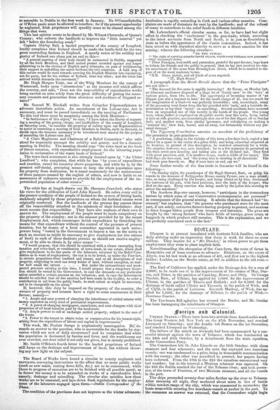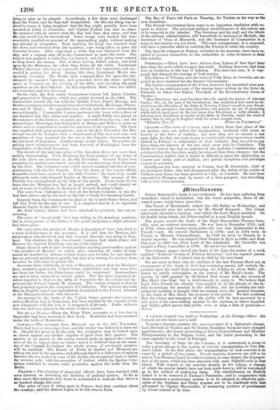forrign anti Colonial.
UNITED STATEB.—There have been two arrivals from Amerizathis week The Great Western left New York on the 27th November, and reached Liverpool on Saturday; and the Acadia left Boston on the 1st December, and reached Liverpool on Wednesday.
The failure of the attack on Alvarado had been compensated by a suc- cessful attempt against the town of Tobasco; which was bombarded on the 24th and 25th October, by a detachment from the main squadron, under Commodore Perry.
The Commodore left St. John Lizardo on the 16th October, with three steamers and four schooners; and the next day captured two American vessels: one was condemned as a prize, being in treasonable communication with the enemy; the other was permitted to proceed, her papers having been endorsed. From the 17th to the 22d the squadron encountered very bad weather; but in the interval a Mexican schooner was captured. On the 23d the flotilla reached the bar of the Tobasco river; and took posses- sion of the town of Frontera, of two Mexican steamers, and all the vessels in the port.
The ships proceeded seventy-four miles further up the river to Tobasco. After steaming all night, they anchored about morn in line of battle within musket-range of the city, which was summoned to surrender; the boats meanwhile securing five merchant-vessels at anchor in the port. To the summons an answer was returned, that the Commodore might begin
firing as soon as he pleased. Accordingly, a few shots were discharged knot the Vixen, and the flag-staff disappeared. On this the firing was or- dered to cease, it being imagined that the flag might possibly have been lowered in token of surrender; and Captain Forrest was sent on shore. Be returned with an answer that the flag had been shot away, and that the city would not be surrendered. Some troops were landed, but were eventually recalled on account of the approaching night, without making any attempt at occupation. Next morning the firing was renewed from the shore, and returned from the squadron; care being taken to spare the Consular houses. After some time a white flag was displayed from the city, and a request sent off to the Commodore to spare the town. The request was granted, a white flag was hoisted, and the prizes were ordered to drop down the stream. One of these having drifted ashore, was fired upon by the Mexicans, the white flags flying all the while. Lieutenant Parker, however, who was in command, defended her vigorously, and suc- ceeded in getting her afloat. During this time, Lieutenant Morris was mortally wounded. The flotilla then reopened their fire upon the city, silenced the enemy's batteries, and proceeded down the river; arriving again at Frontera on the evening of the 26th, and rejoining the main squadron on the 31st October. In this expedition there were two killed, two wounded, and two drowned.
On the 12th, the fleet under Commodore Connor left Anton Lizardo, and proceeded to Tampico; which was quietly invested on the 14th. The Commodore crossed the bar with the Spitfire, Vixen, Petrel, Bonetta, and Reefer, containing reinforcements from the Cumberland, Mississippi, Prince- ton, and St. Mary's. No opposition was offered, and the town surrendered unconditionally. Commodore Connor garrisoned the town with a force of one hundred and fifty sailors and marines. A small flotilla was placed at the entrance of the harbour, to guard any approach from the sea; and the steam-frigate Mississippi was despatched to Brazos and Belize, in order to obtain a force competent to insure the retention of the capture. The force was supplied with great promptitude; and on the 21st November the Mis- sissippi set out for Tampico with a detachment of fifty men and guns and munitions of war, tendered for the use of the Supreme Government by the Governor of Louisiana. Further troops would follow. Despatches re- quiring these reinforcements had been received at Washington from the Commodore of the Gulf Squadron.
The details of the land operations of the American forces are more than usually uuinteresting. From Monterey, the head-quarters of the Army of the Left, there are accounts to the 4th November. General Taylor was preparing for another movement, and all the regular troops were advanced up the river. The volunteers were relied upon to maintain the line of com- munications with the Rio Grande. From the Army of the Centre official despatches had been received to the 14th October: the main body would ultimately unite with General Taylor at Monterey. The passage of the Presidio was accomplished on the 1 1 th of the month. From Santa Fe we learn that the Mormon levy had at length arrived, and would shortly set out en route to California, in the track of General Kearney's force.
The news from Chihuahua is, that all the foreign residents in the city had been driven out by the mob on the fall of Santa Ed becoming known.
General Scott, the Commander-in-chief of the United States forces, had left New York for the seat of war. It is supposed that he is to supersede General Taylor in the chief command. Mr. John Quincy Adams had been attacked by paralysis, but was re- covering.
The price of bread-stuffs " had been falling in the American markets; but in consequence of the closing of the canal navigation a slight advance had taken place.
The news from the interior of Mexico is important if true; but there is a want of distinctness in the accounts. It is said that the Mexican Ad- ministration was dissolved, and that General Almonte was going to Eng- land. The elections for the Constituent Congress had taken place; and Herrera, the deposed President, was one of the elected.
Santa Anna is said to have issued another exciting proclamation against "the invaders of Mexico," in which, after exhorting all ranks to rally round his standard in defence of their homes and firesides, he says that he has no personal ambition to gratify, but that after freeing his country from invasion he will retire to private life.
Accounts from California, by way of Mazatlan, report that the Mexicans have mutinied against the United States authorities; and that some lives had been lost before the disturbance could be suppressed. Insurrections are said to have occurred at several points. But the most important in- cident reported is that on the 29th of September the Americans had im- prisoned the French Consul, M. Gasquet. The reason assigned is that he had protested against the occupation of California. The account also adds that an English vessel was immediately despatched to the French Admiral at the Marquesas Islands, with the news. An attempt by the boats of the United States corvette the Cyane, to seize a Mexican brig at Guayamas, had been repelled by the Captain of the port (Spencer) with the loss, it is computed, of 20 men. Entire reliance was not, however, placed in the truth of these reports.
RIO DE LA PLATA.—From the River Plate accounts to a late date in September had been received in New York. Hostilities had been resumed under the walls of Montevideo.
CANADA.—The accounts from Montreal are to the 23d November. There had been a three-days frost, and the winter was believed to have set in. Should this prove to be the case, the navigation may be looked upon as closed against any further supplies of grain from that quarter. The opinion of all parties in the colony seemed made up against the continu- ance of the 38. import-duty on wheat; and it is believed that on the meet- ing of the Colonial Parliament the whole system of provincial taxation will be modified. The Boards of Trade at Quebec and Montreal are taking the lead in the question; and although there is a difference of opinion between the two bodies in some of the details, the recognized basis is duties far revenue only, with the exception of timber, which the Quebec Com- mittee considers to require some protection against the trade from the Baltic.
Fitascs.—The elections of municipal officers have been watched with some interest, as indicating the direction of political opinion. So far as they serve that purpose, they must be understood to indicate that there is no marked change this year.
The price of corn is rising again in France; food riots continue about the country; and the distress begins to be felt even in Paris.
The Bey of Tunis left Paris on Tuesday, for Toulon, on his way to his own dominions.
The French Government have come to an important resolution with re- spect to Algiers. The principal military establishments of the colony are to be removed to the interior. The Governor and his staff, and the whole of the military administration, will henceforth be stationed at Medeah; the Governor of Oran at Mascarah, and the Governor of Constantine in town in the interior not yet fixed. This new arrangement, it is supposed, will have a powerful effect in enabling the French to settle the country.
The Spanish refugees in France, included in the amnesty, have been re- quired to present themselves to the authorities in order to return to their own country.
PonTErwa..—There have been advices from Lisbon of four days' later date than the news which we gave last week. Nothing, however, had been done at Santarem in the way of fighting. The incessant rain, it is sup- posed, had damped the courage of both parties.
The fortress of Valence, and the town of Villa Nova de Cerveira, are re- ported to have declared for the Queen's Government. The Lisbon correspondent of the Times, however, has furnished what pro- fesses to be an authentic copy of the strange letter written by the Duke de Palmella to Sefior Jose Passos, President of the Revolutionary Junta of Oporto—
"Most Illustrious and most Excellent Sir—To satisfy the desires of Admiral Parker, who, on the part of his Government, has manifested how mush he de- sired to see the liberation of the Duke de Terceira, I direct myself to your Excel- lency, in the persuasion that your Excellency will practise an act of generosity which will do much good to the just cause your Excellency so nobly defends; it behoving your Excellency to require of the Duke de Terceira, under his word of honour, that he will go to England while the actual struggle lasts.
"Hibernia, Nov. 27. DUKE DE PALM:ELLA."
CRACOW.—The Jews of Cracow, says a letter from that place of the 1st instant, were not, before the incorporation, burdened with taxes so heavily as the Jews of Gallicia ; but now they are to sustain a tax upon light, for they are made to pay a considerable duty upon every candle lighted on Fridays in celebration of their Sabbath: they are also to pay three times the amount of the tax upon meat paid by Christians. The Rabbi of Cracow has had an audience of the Austrian Commissioner, and petitioned that the Israelites might be released from these charges; bat the Commissioner replied, that it would be difficult to grant his application, as Cracow now forms part of Gallicia, and partial exceptions and privileges cannot be accorded.
Intelligence has been received at Vienna, that M. Dembniski, chief of the insurgent Poles, who had disappeared after the defeat of the nobles of Gallicia, near Lissa, has been arrested at Cilly, in Carniola. He had been concealed in Hungary, and, by means of a false passport, was travelling with a lady when arrested.



























 Previous page
Previous page